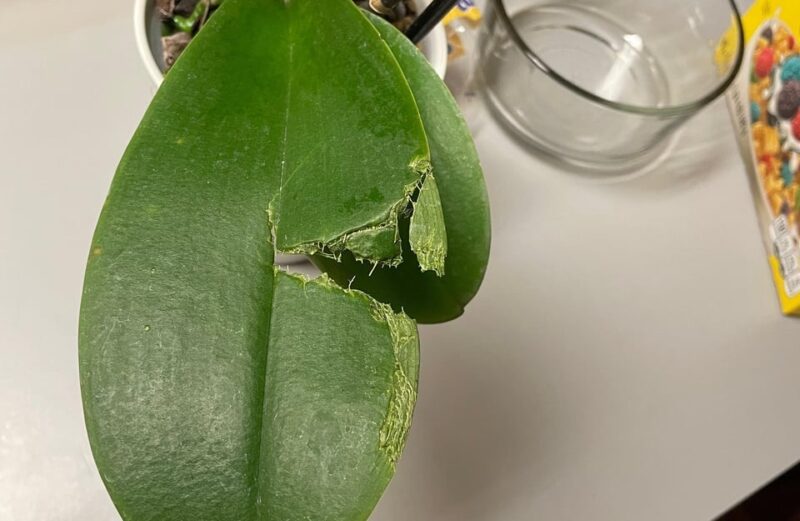Splitting orchid leaves are really frustrating. You’ve put in the hard work to get your orchids blooming and looking perfect. Then you find the leaves are splitting.
It can be a real blow. How you solve splitting leaves is to work out what the reason is for it. This way you can fix the problem and make sure it doesn’t happen again.
So I’ll take you through the main causes of orchid leaves splitting and the best ways to both save your orchid and stop it from ever occurring again.
1. Inconsistent Watering Practices
Orchids like to have consistent watering. If you’re over or under doing it then it will upset your orchid and could lead to split leaves.
Overwatering
Too much water can cause the roots to rot. This will stop your orchid from being able to absorb the nutrients it needs, which will cause the leaves to become weaker and split.
Underwatering
Not enough water will make the leaves dehydrated and brittle. This makes them more likely to crack and split.
Solution
You should be watering on a consistent basis. Let the pot tin medium dry out a little between watering. You can use a moisture meter to keep track of how moist the soil is if you’re not sure.
2. Low Humidity Levels
Orchids do best in higher humidity. Dry air can make the leaves lose moisture very quickly and this will make the leaves split.
Solution
Keep the humidity levels in your home between 50% and 70%. Use a humidifier to increase the humidity if you need to or you can put a tray filled with water near your orchid which also works.
3. Exposure to Direct Sunlight
Orchids need light but too much can do real damage. If your orchid gets too much do text sunlight it can burn it and cause the leaves to be damaged and split.
Solution
Put your orchid or orchids somewhere that has bright, indirect light. If that isn’t possible then use a sheer curtain to diffuse the light.
4. Physical Damage
Accidental bumps, handling your orchid roughly or even some environmental issues like strong winds can damage the leaves and cause them to split.
Solution
Put your orchid somewhere that is stable and away from lots of people or where they will be walking/convening. That way they’re less likely to be bumped into. On top of that be very gentle when you are handling your orchid.
5. Nutrient Imbalances
Both a lack of and too much in the way of nutrients can weaken the leaves of your orchids and make them more prone to splits.
Solution
Use a balanced orchid fertilizer and follow to the manufacturer’s instructions. Don’t over fertilize as a buildup of salt can damage your orchid.
6. Temperature Fluctuations
If your orchid is subjected to a sudden change in the temperature it can stress it and cause splitting leaves.
Solution
Keep the temperature as stable as you can. Don’t put your orchid near drafts, air conditions or heaters.
7. Pests and Diseases
Orchids can get infestations of pests from the likes of mealybugs. Fungal disease also do the same. And both will weaken the plant.
Solution
Check your orchid regularly for any signs of pests or disease. Treat any problems you find quickly as things can get worse fast.
8. Inadequate Air Circulation
Poor airflow can cause moisture to build p on the leaves of your orchid and potential make the leaves split.
Solution
Make sure there is a good amount of air flowing around your orchids. If you can’t get air circulating then use a fan.
9. Improper Potting Medium
If you use the wrong potting medium it can affect how well it holds it on to moisture and in turn the health of the roots will be affected. This can cause issues with the leaves.
Solution
Choose a mix that drains well and is right for your specific type of orchid. Then repot your orchid every 1 to 2 years.
10. Genetic Factors
Some orchids species are simply more likely to get split leaves because of how they grow.
Solution
Research your species of orchid so you understand what you need to do to care for it and any predispositions it has.
11. Chemical Exposure
Being exposed to chemicals like pesticides or cleaning products can damage orchids leaves and lead to them splitting.
Solution
Keep your orchid away from anywhere you’re using chemicals. If you’re dealing with pests on your orchid then use products that are specifically safe for orchids.
12. Aging Leaves
As orchids get older their leaves may naturally deteriorate and split.
Solution
Remove the old or damaged leaves on a regular basis as it will help to encourage new growth.
13. Edema
Edema is when orchids absorb water gasket then they can use and get rid of it. This can cause the cells to burst and the leafs split.
Solution
Make sure you’re not watering too much or too often and be sure your ordhid has good air flow.
14. Overcrowding
Putting your orchids too close together an stop the air from flowing and make the humidity too high. This can cause issues with the leaves.
Solution
Keep your orchids a decent distance apart and let the properly flow between them.
15. Improper Pruning
If you prune your orchid the wrong way then it can damage the leaves.
Solution
Make sure you’re using sterilized tools and the right technique when you prune.
16. Water Quality
Water that contains a lot of minerals can cause salt to build up in the soil and affect how healthy the leaves are.
Solution
Use distilled water for watering. Or collect rainwater and use that as a natural and cheaper alternative.
17. Stress from Repotting
Repotting can stress orchids. This in itself might not cause long term damage but can cause issues with the leaves, like splitting.
Solution
Handle your orchid gently when you’re repotting it. And be attentive with your care after you’ve done the reporting to reduce the chances of stress.
18. Inadequate Light Levels
Both too much and too little light can weakness the leaves and make them more likely to split.
Solution
Give your orchid the right amount of light based on the species of orchid and what it needs.
19. Planting in Non Breathable Containers
Orchids don’t like the most traditional sort of pots without any ventilation or drainage. Pots that don’t allow them to breathe and they trap moisture will cause root problems and in turn weaker leaves.
Solution
- Choose Containers with Holes: Always use a pot that is specifically designed for orchids. They will usually have lots of drainage holes and side slats to let the air flow.
- Consider Clear Pots: Clear plastic pots can also help you to keep an eye on the health of the roots. This stops you from overwatering and the roots rotting, both of which can cause weakened leaves and eventual splitting.
20. Seasonal Stress
Transitioning between seasons can affect the health of your orchid. For example – a sudden amount of cold weather in the winter or intense heat in summer can shock your orchid and lead to the leaves splitting.
Solution
- Adjust Location Seasonally: Move orchids away from drafts in the winter and don’t put them in windows during the hot summers.
- Consider Humidity Adjustments: In the winter our homes are often drier so it can help to increase the humidity levels with a small room humidifier or misting.
21. Infrequent Fertilizing Schedule
Orchids need fertilizing but if you don’t do it regularly or use a ferilizer that’s too strong you’re going to hurt your plant. The leaves will suffer and possibly split.
Solution
Stick to a Diluted Fertilizer: Use a balanced orchid fertilizer. Dilute it to a quarter or half-strength and use it every 2 to 4 weeks during the growing season.
Flush Out Salts Periodically: Every month, flush the potting mix with clean water. This will wash away the salt that’s built up from fertilizers. This can damage the leaves over time.
22. Mechanical Stress from Frequent Moves
Constantly moving your orchid around and putting it in different places can actually stress it. Orchids like stability.
Solution
Choose a Permanent Spot: Find a place that has the right light and humidity and just keep your orchid there.
And only move the orchid if absolutely necessary like when you’re repotting it or cleaning.
23. Incorrect Misting Techniques
Misting orchids is sometimes a good idea but if you overdo it or spray the leaves it can cause some problems. The moisture might cause bacteria spots or make the leaves weaker.
Solution
Mist Sparingly: Mist around the orchid rather than directly on it. This is especially important if the plant is in a cooler environment.
Wipe Off Excess Moisture: If the leaves become damp wipe them dry.
24. Plant Acclimatization After Purchase
After you get a new orchid it may bed some to to get used to it’s new environment. Whilst it’s doing so its leaves might split.
Solution
Allow for Gradual Acclimatization: Don’t rush to repot it or make any huge changes right away. Give it a few weeks to settle.
Provide Stable Conditions: Keep the plant in an area with stable and consistent levels of light and humidity as it will ease the transition.
25. Age of the Orchid Plant
Lastly, it’s natural for older orchid leaves to show signs of wear, including splitting. This is just normal part of the plants life cycle.
Solution
Prune When Necessary: Remove the older leaves if they begin to yellow or crack but leave any that are still green and healthy.
Celebrate New Growth: Focus on getting the conditions right for new growth. They will replace those leaves over time.
Practical Tips for Ongoing Orchid Health
These are a few easy tips to keep your orchid leaves healthy and stop them getting splits:
- Water consistently but don’t leave the roots sitting in water.
- Keep the humidity levels steady (50 to 70%) and make sure the air flow is good.
- Protect your orchid from direct sunlight and cold drafts.
- Fertilize with diluted orchid fertilizer on a regular basis.
- Keep the potting medium fresh by repotting it every 1 to 2 years.
Final Thoughts
Orchids are a bit more delicate than other houseplants. But if you give them the right care and stability their leaves should be fine.
Keep a close eye on what they like and react to any changes. If you do this your orchids leaves will stay healthy and not get any splits.




